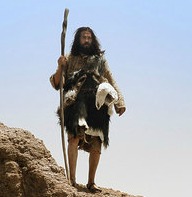
7 And this was his message: “After me comes the one more powerful than I, the straps of whose sandals I am not worthy to stoop down and untie. 8 I baptize you with water, but he will baptize you with the Holy Spirit.”
Each time I prepare for this study of the Gospel of Mark, I keep being struck by the depth of the material when examining just a couple of verses. Looking at verses seven and eight of the first chapter of Mark, there are a number of themes that can be explored.
- The elevation of Jesus over John
- Baptism as a holiness rite and Jesus as an alternate source of Holiness
- Baptism as a sign of conversion - Gentile audience - non-circumcised
- Baptism with the Holy Spirit - source - allusion to move away from law to the spirit.
Elevating Jesus Over John
In the previous post, we looked at the need for the Gospel writer and his community to elevate Jesus over John and the importance of portraying John as endorsing Jesus as not only carrying on the spirit of his mission, but being its purpose. John was likely a more popular and well known figure than Jesus in the time and place the Gospel was written. Jesus had also likely been a student of John and only twenty years after Jesus' death there may have been those around who remembered this. John was popularly accepted as a figure exemplifying holiness and renewal. His endorsement legitimizes Jesus with the audience and sets the tone that his teaching follows the same vein.
Baptism As A Holiness Rite
There are also a couple of themes in Mark's Gospel that are introduced here. One of these themes is the presentation of Jesus as an alternate source of holiness and purity to the Jewish people.
One of the major principles of First Century Second Temple Rabbinical Judaism was holiness. This viewed God's defining attribute as being holy, special, set apart, and pure, as opposed to the baser nature of his creation. The goal of humanity and the chosen of Israel was to imitate God in this regard. In Exodus 22:31, they are told, “You are to be my holy people", and likewise in Exodus 19:6, "you will be for me a kingdom of priests and a holy nation." This ethos can be summed up in the phrase, "be Holy as God is Holy" (Lev. 20:26). As such, much of Judaism saw things in terms of a dichotomy between that which was holy and that which was profane, what was clean and what was unclean, what was pure and what was base.
The Law centred on separating the people from those objects and behaviours that were considered unclean and would contaminate them, making them unable to approach the holiness of the presence of God. Breaking the purity laws through exposure to blood and other bodily emissions, dead bodies, certain foods, and other items considered to be base, broke the holiness contract between the Hebrew people and God. This contract provided a penalty for breaches in the form of animal sacrifice, but the people were also required to perform ritual cleansing and purification rites to even approach God to make those payments.
Jesus and his followers held a different view on God's defining attribute. As 1 John 4:8 states, "God is love". Jesus portrayed God as a loving intimate parent, his "Abba", or "Poppa". All the law could be summed up and fulfiled with just two commandments, love God, and love others. For Jesus true holiness was found in the principles behind the social laws, not the minutiae of purity practises.

Opening the Gospel with a baptism scene could have been a way to reinforce to themselves and those around them that they were not abandoning purity and holiness before God. Jesus and The Way were not anti purity, they just saw it in a different manner. The statement about Jesus coming to baptise the people with the Holy Spirit implies an even greater purifying and holiness.
Baptism As An Initiation Rite
Baptism, along with being a purity rite, was also used by Judaism as an initiation ritual into the Jewish faith.
Kaufmann Kohler and Samuel Krauss in their article on baptism state that:
Baptism With The Holy Spirit

Verse eight in today's passage has John testifying that Jesus will baptise with the Holy Spirit. Kohler and Krauss have some insights on this as well:
Jesus and his followers held a different view on God's defining attribute. As 1 John 4:8 states, "God is love". Jesus portrayed God as a loving intimate parent, his "Abba", or "Poppa". All the law could be summed up and fulfiled with just two commandments, love God, and love others. For Jesus true holiness was found in the principles behind the social laws, not the minutiae of purity practises.
You give a tenth of your spices—mint, dill and cumin. But you have neglected the more important matters of the law—justice, mercy and faithfulness. (Matthew 23:23)The ethos of the followers of The Way, as they called themselves, could be summed up in a different, imitatio Dei, that could be stated as, "be Loving, as God is Loving". Given this, and the description given of early Christian community in Acts, we could expect that the community that the writer of Mark belonged to did not practise many of the purity taboos prescribed by the law. As such, we can imagine that they suffered the scorn and criticism of their more observant neighbours.

Opening the Gospel with a baptism scene could have been a way to reinforce to themselves and those around them that they were not abandoning purity and holiness before God. Jesus and The Way were not anti purity, they just saw it in a different manner. The statement about Jesus coming to baptise the people with the Holy Spirit implies an even greater purifying and holiness.
Baptism As An Initiation Rite
Baptism, along with being a purity rite, was also used by Judaism as an initiation ritual into the Jewish faith.
Kaufmann Kohler and Samuel Krauss in their article on baptism state that:
According to rabbinical teachings, which dominated even during the existence of the Temple (Pes. viii. 8), Baptism, next to circumcision and sacrifice, was an absolutely necessary condition to be fulfilled by a proselyte to Judaism (Yeb. 46b, 47b; Ker. 9a; 'Ab. Zarah 57a; Shab. 135a; Yer. Kid. iii. 14, 64d). http://jewishencyclopedia.com/articles/2456-baptismGiven the accounts in Acts of early Christian communities and the fact that the book of Mark spells out some Jewish practise as to someone who was unfamiliar with it, we can be certain that there was a Gentile component to the community of Mark. Again looking to Acts, we see that circumcision was not required for non-Jewish converts as had been demanded in main stream Judaism. With the temple being destroyed, sacrifice was not an option either. This left baptism as the sole initiation ritual for Gentiles entering this sect of Judaism. As such, it would have been important for Christian Gentiles in order to claim to be part of "God's chosen people" and claim the heritage which this entailed. By opening their Gospel with a baptism scene, they could have been reminding themselves, and pointing out to those around them, that they had a legitimate claim to the Jewish faith.
Baptism With The Holy Spirit

Verse eight in today's passage has John testifying that Jesus will baptise with the Holy Spirit. Kohler and Krauss have some insights on this as well:
The only conception of Baptism at variance with Jewish ideas is displayed in the declaration of John, that the one who would come after him would not baptize with water, but with the Holy Ghost (Mark i. 8; John i. 27). Yet a faint resemblance to the notion is displayed in the belief expressed in the Talmud that the Holy Spirit could be drawn upon as water is drawn from a well (based upon Isa. xii. 3; Yer. Suk. v. 1, 55a of Joshua b. Levi). And there is a somewhat Jewish tinge even to the prophecy of the evangelists Matthew (iii. 11) and Luke (iii. 16), who declare that Jesus will baptize with fire as well as with the Holy Ghost; for, according to Abbahu, true Baptism is performed with fire (Sanh. 39a). http://jewishencyclopedia.com/articles/2456-baptismJohn's statement that Jesus would baptise the people with the Holy Spirit introduces another theme in the Gospel; Jesus as one who fulfils and supersedes the Law. This alludes back to the giving of the Law with Moses and the Hebrew people at Mount Siani. The people felt that the presence and Spirit of God was too much for them and asked Moses to be their intermediary.
18 When the people saw the thunder and lightning and heard the trumpet and saw the mountain in smoke, they trembled with fear. They stayed at a distance 19 and said to Moses, “Speak to us yourself and we will listen. But do not have God speak to us or we will die.” (Exodus 20:18-19)Moses was anointed with the Holy Spirit as part of his intimacy with the presence of God. After spending time in the presence of God, receiving God's instruction, his face would shine with the radiance of the Holy Spirit. The rest of the people, unable and unwilling to come into God's presence, had to do with God's direction second hand in the poor substitute of the Law.
Jesus, according to this announcement, had come to bring this same Spirit and intimacy as Moses had with God to the people. As such, Jesus, was initiating them with a baptism of the Holy Spirit into an access to the presence of God that made the Law no longer necessary.
Paul's letter to the Galatians was written before the Gospel of Mark. These letters were used by the early Christian communities as part of their liturgy. It is not known if Mark's community had access to this specific letter, but it suggests the thinking of these communities in terms of Jesus and the Law.
Paul's letter to the Galatians was written before the Gospel of Mark. These letters were used by the early Christian communities as part of their liturgy. It is not known if Mark's community had access to this specific letter, but it suggests the thinking of these communities in terms of Jesus and the Law.
4 You who are trying to be justified by the law have been alienated from Christ; you have fallen away from grace. 5 For through the Spirit we eagerly await by faith the righteousness for which we hope. 6 For in Christ Jesus neither circumcision nor uncircumcision has any value. The only thing that counts is faith expressing itself through love. (Galatians 5:4-6)









